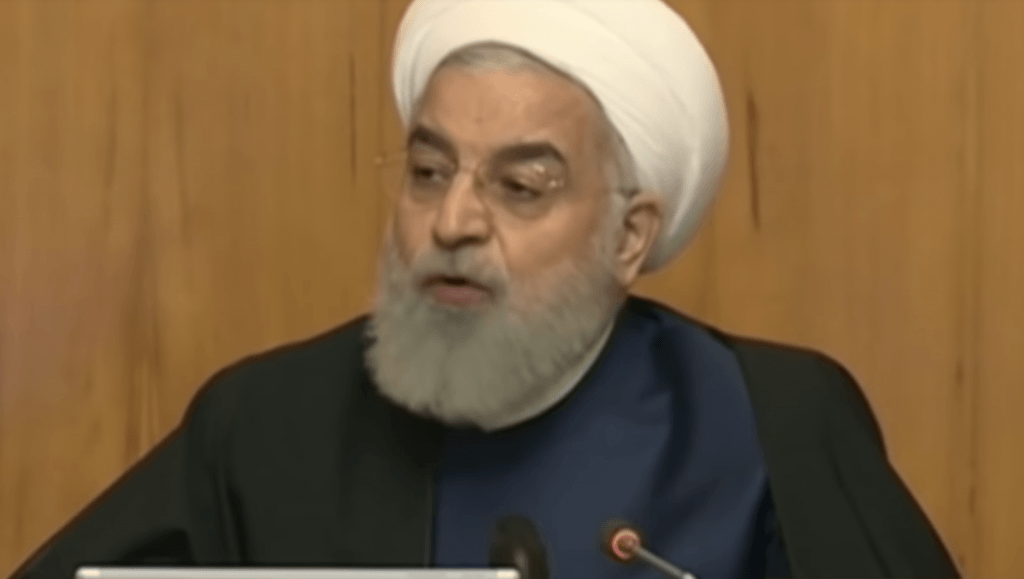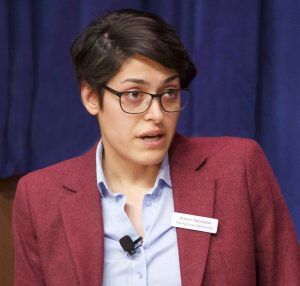The 10-minute interview: Ariane Tabatabai on tensions over the embattled Iran nuclear deal
By John Mecklin | May 8, 2019
 Iranian President Hassan Rouhani
Iranian President Hassan Rouhani
Iran’s president, Hassan Rouhani, announced Wednesday that his country would stop complying with specific elements of the nuclear agreement his country reached with major world powers in 2015. The announcement followed recent US moves that aimed to exert “maximum pressure” on Iran to renegotiate the Iran nuclear deal, which the United States left last year. The American actions include the movement of military forces to the Middle East and the enforcement of sanctions on Iranian crude oil exports and its banking system. Most recently, the Trump administration even reinstated sanctions against some exports that helped Iran limit the amount of nuclear material in the country and thereby to abide by the nuclear agreement.
On Wednesday, Rouhani gave a televised speech in which he said Iran would stop taking action to keep its stocks of enriched uranium and heavy water below levels set out in the nuclear agreement, known officially as the Joint Comprehensive Plan of Action, or JCPOA, and set a 60-day deadline for negotiations that would give Iran financial relief of some sort.

Though it does not signal an immediate Iranian withdrawal from the nuclear deal, Rouhani’s announcement is generally seen as indicating Iran’s impatience with adhering to an agreement from which it receives few of the economic benefits envisioned when the JCPOA was negotiated. In a short interview following the announcement, I asked Bulletin columnist and Rand Corporation Iran expert Ariane Tabatabai about the meaning of Rouhani’s announcement, as tensions between the United States and Iran and speculation about military confrontation mount.
John Mecklin: Let’s just jump right in. What did Iran announce today, and why? Why did it change what it’s doing in regard to the JCPOA?
Ariane Tabatabai: Iran announced today that it was going to stop adhering to a couple of limits on its nuclear program, specifically on the stockpiles, the amount of heavy water and enriched uranium it can actually keep. It was going to stop shipping out the excess stockpiles that it has.
This is a decision that I guess we have been waiting for—not necessarily those provisions, but we had been waiting for some sort of response from Iran—since the United States announced that it was pulling out of the nuclear deal a year ago.
What is different, and I guess the reason why the Iranians have decided to do things a little differently, to stop complying with the nuclear terms of the agreement is that there has been a lot of tension within Iran about the direction of the country’s national security policy, and its nuclear policy specifically. There’s been a lot of infighting, a lot of pressure coming from hardliners within the country, targeting President Rouhani… [The nuclear agreement is] really his only real legacy that he has to show for his time in power.
The Iranians had to do something, had to essentially show that, they’re not just sitting on their hands, waiting passively, as the United States dials up pressure on Iran, as it continues to introduce more sanctions on the country.
JM: These moves today, by Iran, were pretty direct responses to recent things the United States had done with sanctions and waivers, correct?
AT: Yes, that’s right. They have tried to frame the action, this reaction really, in a way that would allow Iran to continue to look like the responsible party in the international community, and to directly tie the steps it’s taking to the US measures, to the measures that the [Trump]administration has been taking over the past year.
Now, it’s not clear that this sort of narrative is going to stick. The Europeans, the Russians, the Chinese don’t want Iran to start taking these steps, especially the steps that Iran has announced it would take if what it’s requesting—actually even more economic recovery—doesn’t come in the next 60 days. Because the steps that it’s announced it would be taking are a lot more challenging, from a proliferation perspective, and would be a lot more problematic for the remaining parties in the deal.
For Iran to continue selling the narrative of the responsible player that it’s really tried very hard to create over the past year, it would have to adhere pretty closely to the JCPOA, and the steps that it’s starting to announce clearly go against that.
JM: These steps don’t immediately create some ability to make nuclear weapons, but they are steps that, if they continued, are along that path. They are things that would open up the possibility of increasing amounts of fissile material.
AT: Just looking at it today, on Wednesday May the 8th, just hours after the steps were announced, I think that the consensus within the arms control and non-proliferation community is that we were expecting a lot worse coming out of Iran, that ultimately it doesn’t increase the urgency with which we have to deal with the actions as much.
Really, what happens next is going to determine where we go from here. And that is, whether Iran does indeed start to actually go above the stockpile limits on enriched uranium specifically, but also whether or not in 60 days, it takes additional measures, in response to what it would view as a lack of return for what it bargained for.
JM: What are some realistic things that you think the Europeans, the Russians, the Chinese could do that would assuage Iran’s feeling that it’s been snookered here? These sanctions don’t seem to allow anybody to buy Iranian oil. Is there a way around that?
AT: Well, I’m not the best qualified to talk about sanctions, but from my perspective, I think on a political level, this is really aimed at the Europeans, less so the Russians, and to some degree, the Chinese.
[The Europeans are] boxed in. They’re boxed in between the United States, which is very much eager to continue ramping up pressure on Iran and is not willing to compromise here and has a very specific, a very narrow view of what the path forward looks like.
Iran on the other hand is also increasingly hardening its line and trying to get more concessions from the remaining parties in the deal, to make up for the US withdrawal. So, the Europeans are—it’s tricky right now for them. On the one hand, not complying with US sanctions is not really an option. They have no incentive whatsoever to abandon the US market, which is much larger. It’s not even a question, between the US market or [choosing] the Iranian market, for the sake of Iran.
On the other hand, [the Europeans] really want the JCPOA to continue, and to sustain the deal and the process. So they can’t really give Iran what it wants, but at the same time they can’t really do anything that—even though they disagree with the United States—they can’t really do anything that would violate the US sanctions. They’re in a tough position here, and I just don’t see a world in which the Europeans manage to satisfy Iran, in the next 60 days.
JM: Do you have a handle on Iranian public opinion on this? How do the Iranian people feel about all of this?
AT: Well look, it’s really hard to talk about public opinion in Iran. There are some institutions, the University of Maryland for example, that try to poll Iranians with some regularity on various topics, including this one, but it is hard to know exactly where the public stands, especially when things happen so quickly. And of course, polling in an authoritarian state comes with its own set of challenges.
In general, it seems to me, at least from looking to social media and media reporting about the topic that hardliners are quite happy with the announcement. They saw it as long in coming. I wrote a piece for the Bulletin, I think, about a year ago, about what hardliners are saying on social media, and a lot of it was about the concessions that they believed Iran had made to the P5 plus 1 [the five permanent members of the UN Security Council, and Germany], and the hardliners had really tried to increase pressure, including via social media, on the Rouhani government to take the types of steps that it announced today.
So they seem quite happy that this is going in the right direction, that the country is at long last, showing some sort of guts, and showing that it’s willing to do something. The broader population, I think is a bit more, perhaps more split, but ultimately, for the majority of Iranians, the JCPOA was never about the nuclear issue. They frankly don’t care that much about the number of centrifuges that are spinning in the country.
Some people may think that—and I think a lot of people do—that Iran has a right to have a nuclear energy program, and it should, and so on, and so forth. But the JCPOA was really about economic benefits, and they haven’t seen that. The [Trump] administration is making sure that they don’t see that any time soon. If the JCPOA does not yield those benefits, then there is no point in sticking to it.
I think for the majority of people, the main things they’re looking for are: Is there going to be a conflict? Are the tensions going to keep isolating Iran? Is Iran going to be able to recover economically? And are people going to be able to have jobs, and feed their families? Those are the main questions they’re asking.
But, the JCPOA is an instrument; it’s a means by which they achieve these things, it’s not the end.
Together, we make the world safer.
The Bulletin elevates expert voices above the noise. But as an independent nonprofit organization, our operations depend on the support of readers like you. Help us continue to deliver quality journalism that holds leaders accountable. Your support of our work at any level is important. In return, we promise our coverage will be understandable, influential, vigilant, solution-oriented, and fair-minded. Together we can make a difference.
Topics: Analysis, Interviews, Nuclear Risk, The Iranian problem















A few points need to be stressed here. The first one is that US sanctions are illegal and extraterritorial. Iran signed a landmark agreement not only with the United States but also with all the five permanent members of the Security Council, plus Germany. The deal was endorsed by the EU and by the Security Council Resolution 2231 that lifted all the sanctions on Iran. The United States was a party to that agreement and is violating not only the agreement but by the Security Council resolution as well. The Second point is that with its aggressive policies towards Iran,… Read more »